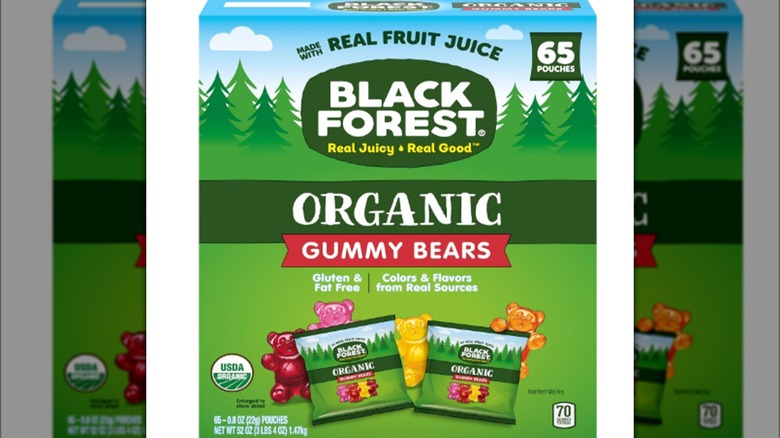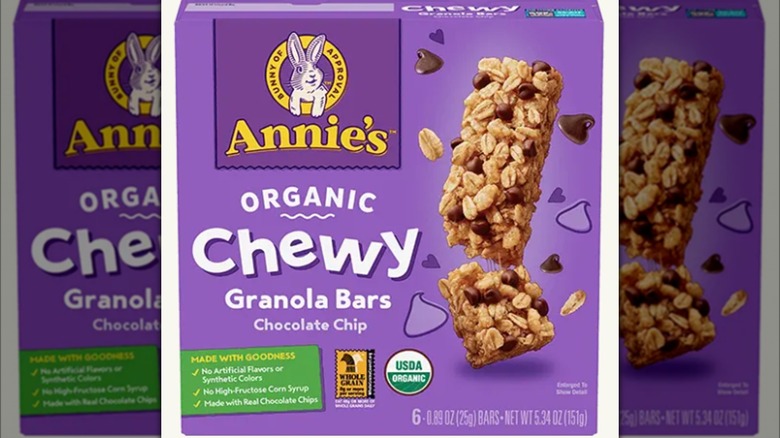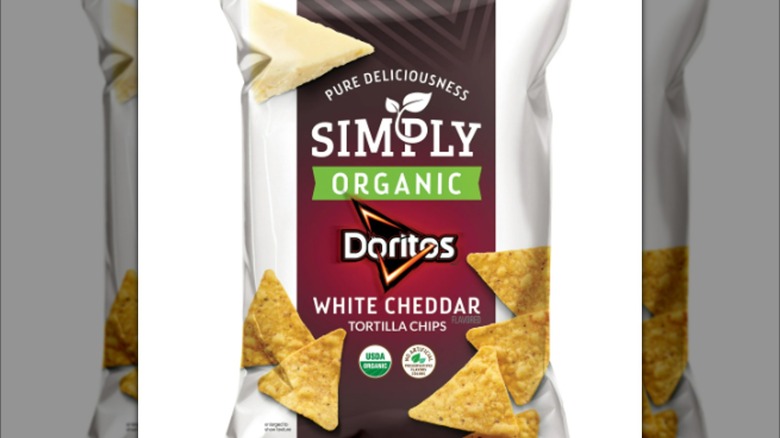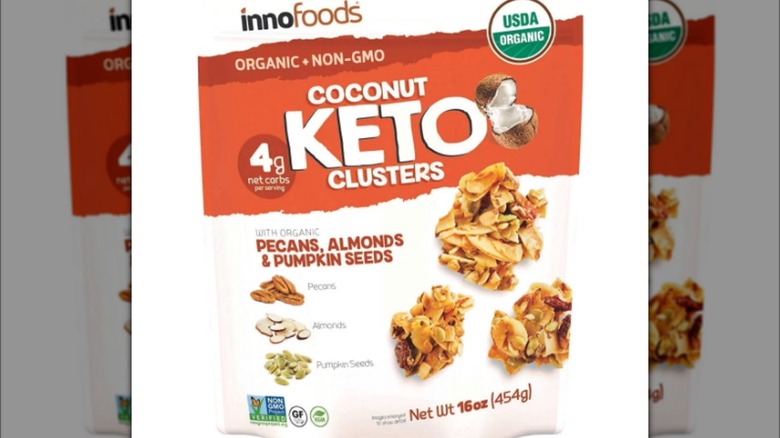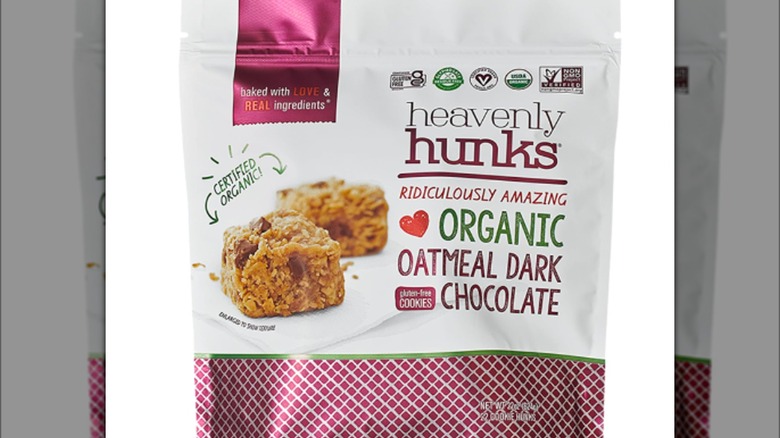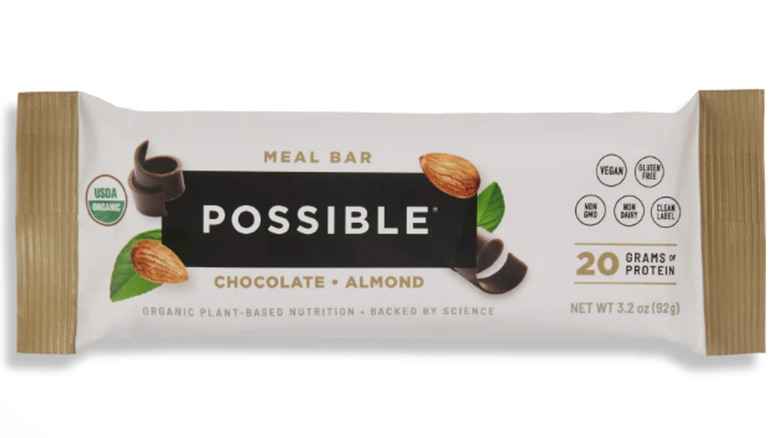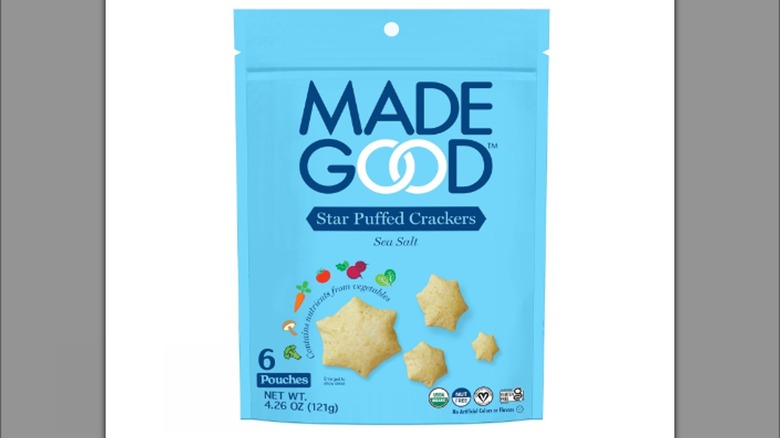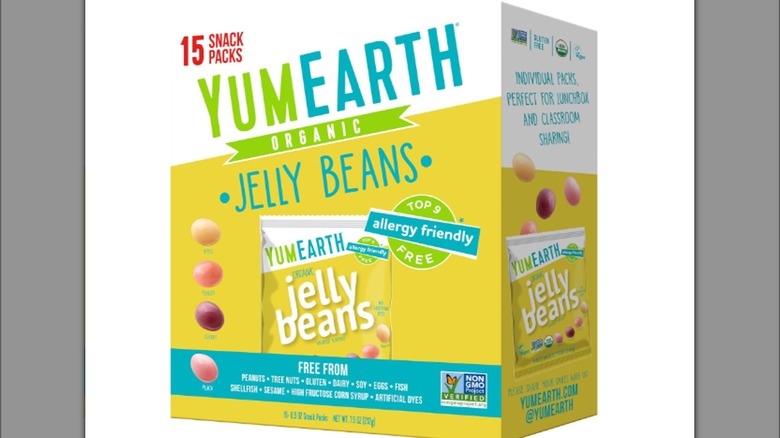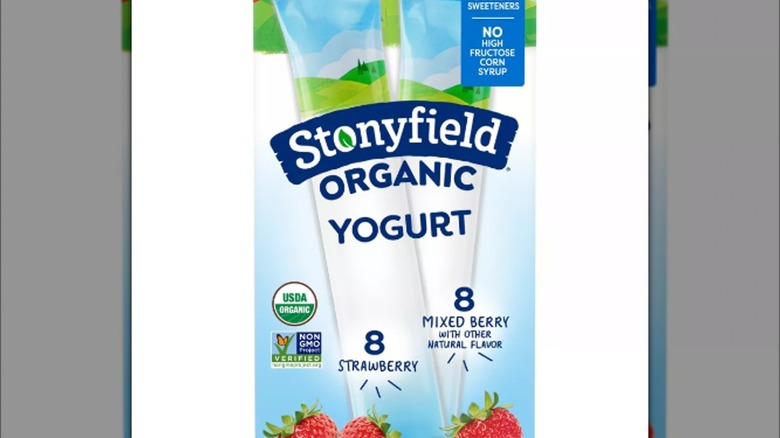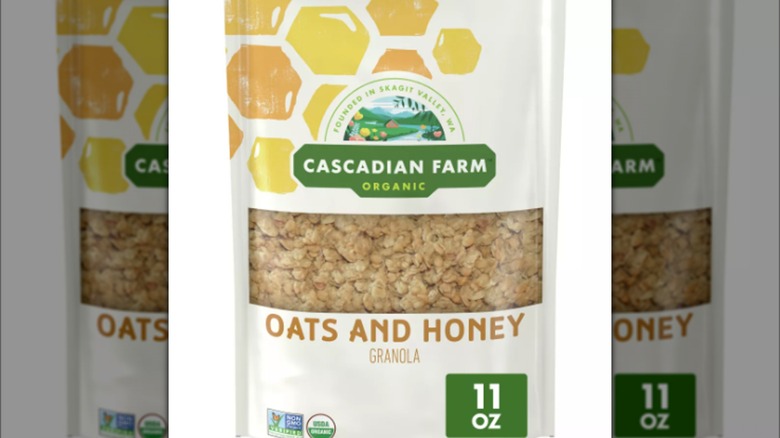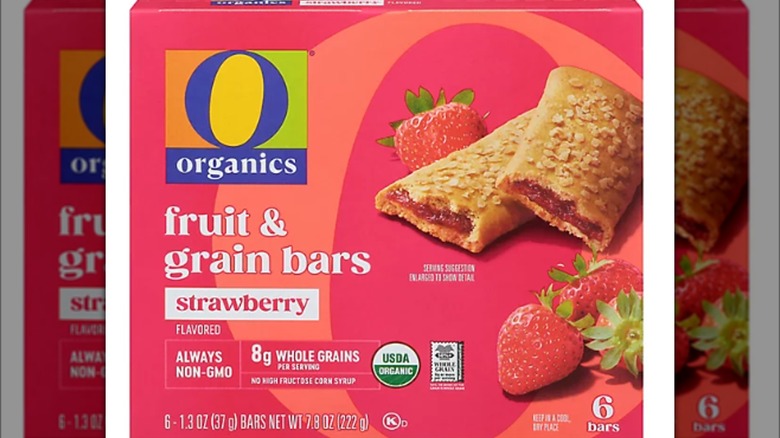11 Unhealthiest Store-Bought Organic Snacks You Could Buy
We may receive a commission on purchases made from links.
In a modern world that is catching on to the negative side effects of processed ingredients and some genetically modified organisms (otherwise known as GMO's) used in food, a widespread organic movement has developed as a counteraction — and it seems to be expanding by the day. Every time we hit the grocery store, it feels like there's a new pack of organic granola bars, bag of organic chips, or box of organic crackers up for grabs, offering shoppers a supposed safe haven from the problematic ingredients usually found in standard store-bought pre-packaged snacks. But what does organic food really mean?
There is a belief that an "organic" label automatically equates to a healthy product. Unfortunately, this is not always the case. While organic store-bought products may follow all the federal agricultural guidelines necessary to earn the title, this doesn't always mean they are free from the shocking amount of added sugars in the typical American diet or the fillers, processed oils and flours, saturated fats, and other less-than-stellar additives our bodies dislike. We took an in-depth look at the nutrition labels slapped across some of the most popular organic picks on the market to find out which snacks you may want to pass by on your next trip to the store. Here are 11 of the unhealthiest store-bought organic snacks you could buy.
1. Black Forest Organic Gummy Bears
Admit it. Whether you're a little kid or a full-fledged adult, you've likely got a soft spot for a handful of brightly colored, chewy gummy bears. The original gummy bear first hit the market in Germany in 1922, and soon the rest of the world was on board with the teeny, sweet-tasting morsels shaped like everyone's favorite furry animal. While these super-sugary bears obviously aren't known for their high nutritional content, you may have thought you'd stumbled across a healthier version in the Black Forest Organic Gummy Bears, available in boxes of 70-calorie snack packs in grocery stores across the United States.
Sadly, you're not faring much better in nutritional content with the Black Forest version than you would with a non-organic gummy bear. While the company's adorable bears are admittedly made from organic juices, they offer nothing in the way of nutrition besides an elevated number of added sugars — 11 grams per snack pouch, to be exact. We do have to give Black Forest some props for avoiding any artificial food coloring, which can be made from a lot of different ingredients and which is what most gummy bear candies are made with. Still, we aren't convinced the product's exclusive nutritional offering of added sugars is redeemable in this case.
2. Annie's Organic Chewy Granola Bars
It's no secret that many chewy granola bars are filled with so much sugar and fat that they may as well be labeled candy bars. But when you first come across Annie's Organic Chewy Granola Bars — produced by one of the better-known organic snack companies in the nation — at your local grocery store, you may be tempted to immediately categorize them as a healthier alternative to standard chewy granola bars based on the product's organic label alone.
However, before you spend the cash opting for these chocolate-chip-flavored snacks, it's worth noting that their nutritional label is far from flawless. This Annie's product is highly processed and comes in swinging with the same amount of added sugar as many other chewy granola bar brands. Additionally, the bunny-clad bars include other eyebrow-raising ingredients, such as palm oil (which is high in saturated fats), rice flour (which can contain arsenic), and natural flavors, an extremely wide-reaching and often controversial ingredient called out by consumers for its questionable vagueness. Overall, we just aren't sure your body will be performing the happy dance after you feed it one of these bars — organic or not.
3. Doritos Simply Organic White Cheddar Tortilla Chips
Simply is the Frito-Lay company's line of self-professed cleaner snack products. It includes various bags of Cheetos, Ruffles, Tostitos, Lay's, and Doritos that are free from the artificial colors and flavors that you can find in the original versions. You might have seen one of these products in particular — the Doritos Simply Organic White Cheddar Tortilla Chips — and automatically assumed it'd be a more nutritious appetizer to put out at your next backyard barbecue. But while the organic versions of everyone's favorite crunchy triangles may not have red 40, blue 1, or yellow 5 food coloring included in their recipe, calling them nutritious might be a bit of a stretch.
Don't be fooled in this case by the organic label: the white cheddar Doritos hardly differ from the original chip nutritionally. A serving of standard Cool Ranch Doritos, for example, has 150 calories, 2 grams of protein, 8 grams of fat, and 1 gram of fiber — exactly the same numbers as those found on the organic white cheddar Doritos product. The sodium and carbohydrate counts are virtually indistinguishable as well, and while the ingredients list is admittedly shorter and simpler on the white cheddar Doritos bag, the recipes mirror each other quite closely. Ultimately, the organic Doritos are still just that — Doritos — and can be mostly roped into the "empty calories" ring of snack foods. Bummer.
4. InnoFoods Coconut Keto Clusters
With all the myths about the ketogenic diet, it's worth knowing that the focus is on low carbohydrates and high fats. Shoppers who adhere to keto are always on the hunt for good on-the-go snacks that fall within these particular parameters. One of these is the InnoFoods Coconut Keto Clusters, which consist of bite-sized, sweetened balls of pressed-together pecans, almonds, and pumpkin seeds. They are keto-approved, non-GMO, gluten free, vegan, and — you guessed it — organic.
But while these crunchy little morsels provide the high fat count that keto followers require, unfortunately, the fat is mostly the unhealthy saturated kind. A whopping 8 grams of saturated fats — which are linked to heart disease, Alzheimer's, and obesity — can be found in each measly 1-ounce serving of these addictive, easily poppable bundles. Health-conscious keto consumers out there are probably better off reaching for a snack that contains more of the good heart-healthy fats, such as the monounsaturated, polyunsaturated, omega-3, or omega-6 types. Consider skipping this pre-packaged organic treat on your next Costco shopping trip, which already provides you with a host of benefits, and reach for a handful of macadamia nuts, a hard boiled egg with a creamy yellow yolk, or a ripe-and-ready avocado instead.
5. Heavenly Hunks Organic Oatmeal Dark Chocolate Chip Cookies
Who doesn't want to find a guilt-free cookie to munch on? If you've turned away from your preferred, standard grocery store cookie and headed toward the Heavenly Hunks Organic Oatmeal Dark Chocolate Chip cookie intent on finding a slightly healthier version of your favorite dessert, we hate to burst your chocolate-induced bubble: These little hunks aren't quite as angelic as their title suggests.
With 120 calories, 3.5 grams of saturated fat, and 7 grams of added sugars per modest-sized cookie, you're not coming out too far ahead in the way of nutrition as compared to a non-organic chocolate chip treat. Nutritionix, which has a searchable database of general nutrition information, puts a standard medium-sized chocolate chip cookie as having around 148 calories, 2.4 grams of saturated fat, and 9 grams of sugar — so while you may save a few calories by opting for the Heavenly version, you're increasing your intake of unhealthy saturated fats. In addition, by feasting on this snack, you'll sacrifice what might have been a nutrient-rich whole-wheat flour cookie for the dense fillers that make up the Heavenly Hunks recipe. The product is baked using both tapioca flour and potato starch — two nutrient-lacking gluten-free baking alternatives that don't offer your body much in exchange for their caloric count. While these cookies may make an acceptable bet if you're allergic to gluten, we still say there's likely a more nutritionally sound organic cookie option out there waiting for you.
6. Possible Organic Meal Bars
It's typical for meal bars to contain a higher number of calories, protein, fats, or sugar — similar to a full-sized breakfast or lunch. Still, some consumers believe that meal bars go over the top with the shockingly high number of macronutrients they offer in a single shot — enough to make some turn their backs on the snack completely. But when you spot the Possible Organic Meal Bars, with their simplistic packaging and organic label, they seem to suggest a lighter meal bar option with a more acceptable nutrient count. However, a quick scan of the label on the back reveals numbers just as shocking as those found on a standard meal bar ... and possibly then some.
The Possible Organic Meal Bars sport 20 grams of protein to keep you full longer as well as a relatively clean list of ingredients on the label. However, there are a whopping 31 grams of sugar to be found in each bar — 17 grams of which are added sugars. There are also 420 calories, a hefty 20 grams of fat, and 39 grams of total carbohydrates to consider. If you're hiking a mountain or trying to gain weight, then this high-carbohydrate, sugary, fatty snack could be a healthful addition to your diet in moderation. For many of us going about our day-to-day lives, however, these organic Possible bars may be just a little too much to swallow.
7. MadeGood Organic Star Puffed Crackers
The term "empty calories" refers to foods that provide our bodies with calories but little nutritional value — and sadly, many modern pre-packaged snacks fall into this category. Health-conscious consumers on a mission to find quick and easy snacks offering a bit more in the way of nutrition may have stumbled across the MadeGood Organic Star Puffed Crackers in the grocery store and thought they'd struck gold by the label alone. Certified organic? Nutrients from veggies? No artificial colors or flavors? Gluten free? Checkmate.
While there is indeed some good to be found in this MadeGood snack cracker alternative, there is also a fair amount of negative to consider. Each serving of these salty stars has 6 grams of fat (including 2 grams of saturated fat), 240 milligrams of sodium, and 21 grams of carbs ... but only 1 gram each of wholesome protein and dietary fiber. Not only does this render them mostly empty calories, but the crackers are also baked using palm oil, an ingredient high in saturated fat. Still, to their credit, the Star Puffed Crackers do contain vegetable extracts and are allergen-friendly. If your kid has a nut, gluten, soy, egg, sesame, or dairy allergy and you're not finding an effortless snack they're able to take to school, we're sure that throwing some of these into the lunch box won't hurt when they're eaten in moderation.
8. YumEarth Organic Jelly Beans
It's doubtful anyone has ever thought of jelly beans as being a particularly healthy snack in the first place, but a glimmer of hope may have been ignited within you when you stumbled across the YumEarth Organic Jelly Beans at the grocery store. They're organic, after all — surely they must not be affected by the nutritional downfalls of the standard but complicated-to-make jelly bean candies, right?
Sadly, it simply isn't so. While these harmless-looking little beans are free from all major allergens, nutritionally speaking, they are nothing but added sugar bombs — just like their predecessors. In addition, the ingredients used to sweeten these rainbow nuggets are cane sugar and rice syrup — the latter of which has a higher glycemic index than standard table sugar. Plus they have practically zero nutrients. You'll also find a few preservatives peeking out from the label, such as ascorbic acid, and thickeners, such as pectin — both of which have been known to cause stomach issues, gas, and bloating if consumed in large amounts. The most redeeming quality regarding YumEarth's jelly beans is the product's allergen-free status as well as the fact that no controversial artificial food dyes are used to color them. That's something, at least.
9. Stonyfield Organic Kids' Yogurt Tubes
From Yoplait's Go-Gurts to Danimals Yo-Tubes, portable yogurt tubes have become a popular kids' treat replicated by dozens of yogurt brands time and time again. The problem? Many of these takes contain loads of added sugars and other questionable ingredients that many parents would prefer to avoid. That's where the Stonyfield Organic Kids' Yogurt Tubes come in, offering what initially appears to be a safe haven from the problematic additives found in many standard, non-organic yogurt tube brands.
But before you splurge on a box of Stonyfield tubes for your kids' after-school treats, take a close look at the label on the back. These certified-organic tubes contain 6 live active cultures and are free from any food dyes or high-fructose corn syrup — an undisputed win. However, they also come with 6 grams of sugar per tube; 4 of which are added. There are also 5 milligrams of cholesterol to account for (which, if consumed too often, can raise children's chances of heart disease as they grow) as well as a small amount of saturated fat and some thickeners. To top it all off, there are only a measly 2 grams of protein per serving. Honestly, you're probably better off grabbing a high-quality plain Greek yogurt and mixing it with some honey and fresh berries for a lower-sugar, healthier snack — even if it does take a little longer to prepare.
10. Cascadian Farm Organic Oats and Honey Granola
Cascadian Farm is a well-known company that produces a wide variety of organic snack products such as cereal, granola bars, frozen berries, and more — all of which are made from ingredients grown the old-fashioned way. While this is certainly a feat worthy of celebration, it doesn't necessarily mean that all of the company's products are free from other less-attractive additions. Case in point: the Cascadian Farm Organic Oats and Honey Granola, a bag of mouth-watering crunchy oats coated in sweet honey just begging to be sprinkled atop a plate of chopped apple slices.
But before you go heavy-handed and dump half the bag of this organic granola into your bowl of yogurt in the morning, there's one nutritional element you may want to consider. Each ⅔ cup serving of this snackable topping comes with a whopping 14 grams of added sugar. While some of this sweetness undoubtedly comes from honey, as the product's title suggests, there is also cane sugar and molasses added to the product, per the ingredients label. All in all, this particular organic granola might be a bit overkill in the way of sweetness. If you do decide to use it, you may want to pay close attention to your serving size; it wouldn't take long to hit your daily recommended sugar intake with this one.
11. O Organics Fruit and Grain Bars
Flours, juices, eggs, old fashioned oats — they're all products put out by the organic powerhouse brand, O Organics. This varied company produces an organic take on what feels like everything under the sun, from milk to frozen desserts to — you guessed it — pre-packaged snacks. One of these snacks is a granola bar consisting of a whole grain shell filled with a pureed strawberry jam in the middle, called the O Organics Strawberry Fruit and Grain Bars.
Similar in style to the classic Nutri-Grain Soft Baked Breakfast Bars, the O Organics version may have led you to believe you would have a leg up nutritionally. Unfortunately, this isn't the case. Not only do the O Organics bars have the same amount of carbohydrates and saturated fats as the non-organic Nutri-Grains, but they also have even more added sugar. Additionally, the ingredients list isn't as straightforward or simple as you'd hope, with a lengthy list featuring various additives, processed oils, and thickeners. We aren't sure these fruit and grain bars are really worth the purchase if a healthier organic treat is what you're seeking come snack time. But hey, everything can be eaten in moderation, as the saying goes. If you're craving a strawberry-flavored bar — organic or not — we certainly won't judge you for taking a bite.

